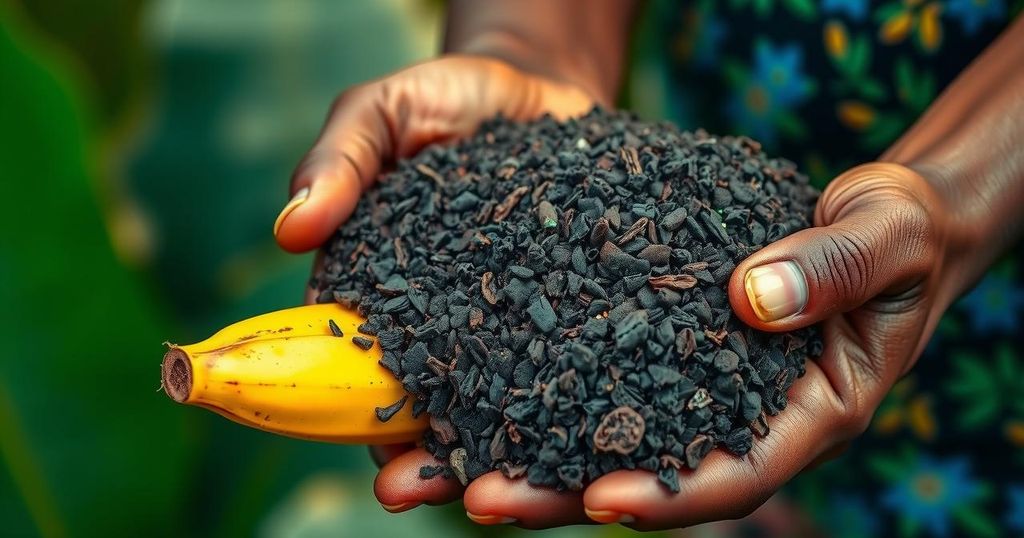Steve Djeutchou is transforming banana peels into biochar in Cameroon, promoting sustainable energy while combating deforestation. He produces three tons of biochar monthly, with the potential to collect 40 metric tons of biomass daily. In addition, he has established a training school to educate locals in renewable energy, thus encouraging environmental stewardship and skill development in the community.
In Cameroon, where the production of charcoal poses significant environmental challenges, Steve Djeutchou, an accomplished environmental engineer, is innovatively converting organic waste into ecological charcoal, known as biochar. Utilizing a local network of suppliers, he estimates the potential collection of biomass in Yaoundé could reach approximately 40 metric tons per day. Currently, Steve produces about three tons of biochar monthly; however, this quantity remains insufficient to address the environmental impact stemming from rampant deforestation associated with charcoal production. From 2002 to 2020, Cameroon lost over 700,000 hectares of forest, stressing the urgency for sustainable alternatives.
In addition to his biochar production, Steve has established a training institution specializing in renewable energy to foster local expertise in sustainable practices. At his workshop, Steve meticulously processes banana peels, which after collection and drying, are transformed into high-quality charcoal. This eco-friendly charcoal is not only more affordable—costing 250 francs per kilogram compared to 500 francs for traditional charcoal—but also generates less smoke, contributing positively to the local environment.
Steve’s training sessions encompass comprehensive topics on waste recovery and biomass conversion, allowing over 400 individuals to gain valuable skills in renewable energy over four years. His commitment to empowering local communities reflects a broader vision of addressing climate change effectively. By cultivating a workforce skilled in renewable energy solutions, Steve aims to foster sustainable development and encourage environmental stewardship in Cameroon and beyond, paving the way for a greener future.
The environmental crisis linked to charcoal production in Cameroon has reached alarming levels, particularly as it threatens the country’s extensive forest reserves, which are among the largest in Africa. Charcoal remains a primary source of energy for many households; therefore, seeking sustainable alternatives such as biochar can mitigate deforestation and improve air quality. Steve Djeutchou’s efforts are pivotal, as he not only addresses waste management through biochar production but also enhances local capacity through education in renewable energy technologies, indicating a grassroots movement towards environmental sustainability.
Through the innovative approach of converting organic waste into biochar, Steve Djeutchou is addressing both the environmental threats posed by traditional charcoal production and the critical need for local skill development in renewable energy. His work not only provides a sustainable alternative but also empowers communities in Cameroon to engage in eco-friendly practices. The dual focus on production and education promises a significant impact on reducing deforestation and fostering a culture of sustainability, thus laying the groundwork for a greener future in the region.
Original Source: news.mongabay.com






